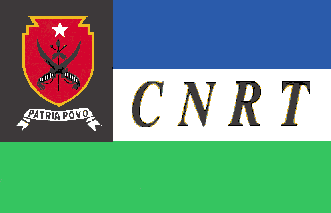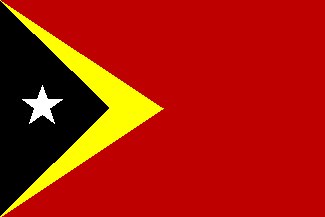





 In contrast with other Portuguese colonies there was initially in East Timor no
liberation movement or armed struggle, though there were sporadic riots or
other manifestations of unrest. In 1974 three political associations were
formed: the Uniao Democratica Timorense (UDT) which first supported gradual
autonomy, and subsequently the granting of independence after a period of
association with Portugal, but finally opted for union with Indonesia; the
Frente Revolucioniria de Timor-Leste Independente (FRETILIN; this movement
initially bore a different name), which advocated independence; and the
Associacao Popular Democritica Timorense (APODETI) which favoured
integration with Indonesia. Later, the UDT joined a group of pro-Indonesian
parties collectively known as the Anti-Communist Movement (MAC).
In contrast with other Portuguese colonies there was initially in East Timor no
liberation movement or armed struggle, though there were sporadic riots or
other manifestations of unrest. In 1974 three political associations were
formed: the Uniao Democratica Timorense (UDT) which first supported gradual
autonomy, and subsequently the granting of independence after a period of
association with Portugal, but finally opted for union with Indonesia; the
Frente Revolucioniria de Timor-Leste Independente (FRETILIN; this movement
initially bore a different name), which advocated independence; and the
Associacao Popular Democritica Timorense (APODETI) which favoured
integration with Indonesia. Later, the UDT joined a group of pro-Indonesian
parties collectively known as the Anti-Communist Movement (MAC).
In 1975 Portugal engaged in consultations with these organizations on the future of the Territory. The choice was between independence, integration into a State other than Portugal (which in practice meant Indonesia), or association with Portugal. The Government in Lisbon made preparations for a general election on the island. The plan was to set up a Popular Assembly. In the meantime local elections took place. But immediately following them the UDT launched a coup d'etat. The FRETILIN responded by staging a counter-coup. The capital of the Territory, Dili, found itself in the hands of the FRETILIN. The fighting involved the various political movements. The Portuguese authorities emphasized that they did not side with any of them. For reasons of safety the authorities left the capital on 26/27 August 1975 and established themselves on the island of Atauro which was part of the Territory.
While the East Timorese political organizations continued to pursue their conflicting policies regarding the Territory's future, Portugal made preparations for further talks with and among them. But the situation became yet more complex when in November 1975 the MAC proclaimed the integration of East Timor with Indonesia and on 28 November 1975 the FRETILIN, for its part, proclaimed the Democratic Republic of East Timor (RDTL). The United Nations did not regard these proclamations as implementing East Timor's right to self-determination A few days later, on 7 December 1975, Indonesian military forces entered East Timor. The next day the Portuguese administration withdrew from Atauro.
Fretilin's ascent in an area contiguous to Indonesian territory alarmed the Indonesian Government, which regarded it as a threatening movement. Following appeals from some of Fretilin's Timorese opponents, Indonesian military forces intervened in East Timor and overcame Fretilin's regular forces in 1975-1976. The culmination of this process was the liquidation of the "zonas de apoio" (logistic bases) of FALINTIL in Mount Matebian in December 1978. Operation Seroja started with massive surrenders of Fretilin cadres and leaders, and culminated with the assassination of the Fretilin (and RDTL) president Nicolau Lobato. Small-scale guerrilla activity persists to this day. In 1984 the FRETILIN abandoned its position on the alleged existence of the Democratic Republic of East Timor (RDTL). FRETILIN has routinely conducted guerrilla actions ever since the 1975 invasion. As of the mid-1990s, it was estimated that FRETILIN/FALINTIL forces numbered less than 200 combat personnel.The National Council of Maubere Resistance [CNRM], led by Xanana Gusmao, is a broad-based organisation set up in late 1987 to unify and lead the struggle of the Maubere (East Timorese) people in response internal disputes within the FRETILIN Delegation for Service in the Exterior (DFSE) and within UDT [Timor Democratic Union]. Jose Ramos-Horta was designated in 1989 as the Special Representative of the CNRM abroad. The Secretary of the CNRM Clandestine Resistance Civilian Front, Pedro Nunes (Sabalae) was captured and murderd on 1 June 1995.
FALINTIL, the Armed Forces for the National Liberation of East Timor was formed in 1975. On 20 August 1975 FALINTIL was ordered by FRETILIN to put an end to the "coup d'etat" of UDT which began on August 11, 1975. The initial structure of FALINTIL was inherited from the former colonial power. FALINTIL, the armed wing of the East Timorese pro-independence movement, is led by Xanana Gusmao. Gusmao who was condemned to death by Jakarta in 1993 for armed insurrection and then had his sentence commuted for 20 years. Xanana Gusmao was taken out of Jakarta's Cipinang state jail where he had been imprisoned since 1993 and moved to house arrest in February 1999. The National Council of Timorese Resistance (CNRT), founded at the First East Timorese National Convention in late April 1998 in Portugal, is a new inclusive umbrella organisation The Timor Democratic Union [UDT], a former political opponent of FRETELIN, is now an ally within the Council of the East Timorese Resistance, along with Apodeti [Timor Democratic People's Association] and KOTA [Kalibun Oan Timor Aswaen]. UDT leader Joao Carrascalao recognized Xanana Gusmao [the jailed Timorese resistance leader] as the resistance's top leader, 20 years after he took up the leadership of the armed struggle. The issue has divided UDT and Fretilin members until the convention. Jose Ramos Horta [Timorese resistance spokesman abroad and 1996 Nobel Peace laureate] was elected vice- president of the national council and of the executive committee.
